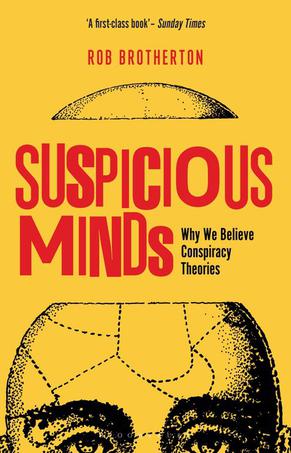We're all conspiracy theorists. Some of us just hide it better than others.
Conspiracy theorists do not wear tin-foil hats (for the most part). They are not just a few kooks lurking on the paranoid fringes of society with bizarre ideas about shape-shifting reptilian aliens running society in secret. They walk among us. They are us. Everyone loves a good conspiracy. Yet conspiracy theories are not a recent invention. And they are not always a harmless curiosity. In Suspicious Minds, Rob Brotherton explores the history and consequences of conspiracism, and delves into the research that offers insights into why so many of us are drawn to implausible, unproven and un-provable conspiracy theories. They resonate with some of our brain's built-in quirks and foibles, and tap into some of our deepest desires, fears, and assumptions about the world.
The fascinating and often surprising psychology of conspiracy theories tells us a lot--not just why we are drawn to theories about sinister schemes, but about how our minds are wired and, indeed, why we believe anything at all. Conspiracy theories are not some psychological aberration--they're a predictable product of how brains work. This book will tell you why, and what it means. Of course, just because your brain's biased doesn't always mean you're wrong. Sometimes conspiracies are real. Sometimes, paranoia is prudent.
-----------------------------------------------------------------------------------------------------------------
Review
“[W]hen we're faced with events we cannot understand, it's natural for our brains to create a narrative--even if it means casting the world in terms of 'us versus' to potentially dangerous ends, as Brotherton puts it. 'There are more conspiracy theorists out there than you might expect,' he writes. 'Chances are you know some. Chances are you are one.'” – Time
“[Brotherton] casts doubt on the assumption that far-fetched beliefs are reserved for the simple-minded or the exceedingly paranoid . . . Although we like to think our judgments are based on evidence, Brotherton reveals that a host of psychological factors come into play whenever we choose what to believe.” – Scientific American
“Brotherton relates the history of conspiracy theories, from the Illuminati and the Great Fire of London to Area 51 and the 9/11 attacks. But he is loath to write off any of these ideas as limited to a lunatic fringe.” – Psychology Today
“Clearly written and with liberal use of humor and numerous examples from scholarly research, this title provides a valuable look at why conspiracy theories abound and why we should continually assess our thinking.” – starred review, Library Journal
“Brotherton illustrates how incomplete, contradictory, coincidental, and incongruent information can allow people to see conspiracies and connections where there are none, due in part to the theories' plausibility and humans' innate desire for order . . . While Brotherton might not convince all believers to remove their tinfoil hats (a concept whose origin he explains), it's sure to make readers question their worldview.” – starred review, Publishers Weekly
“[Brotherton's] writing style is inviting and even cheeky, and the book is a page-turner. A thoughtful, general analysis of conspiracy theories arguing that belief in secret plots is neither new nor unusual but a time-tested part of the human experience.” – Kirkus Reviews
“A thought-provoking analysis and an appealing guide to thinking about conspiracies, real and imagined.” – Wall Street Journal
 Suspicious Mindstxt,chm,pdf,epub,mobi下载
Suspicious Mindstxt,chm,pdf,epub,mobi下载 首页
首页



急躁不得!
很有趣
好书.值得观看.更是值得收藏.
好看,经典,值得一看